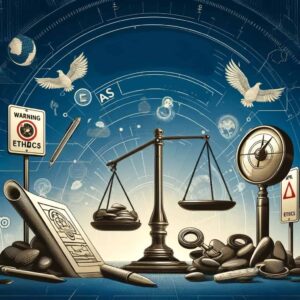Your Guide to Navigating the Tricky Waters of Engineering Ethics
Like any science-based field, engineering has its ethical conundrums. State boards approach these ethical questions and devise ways for engineers to avoid their drawbacks. But how can an engineer stay up to date on these ethical conundrums?
If the public doesn’t trust an engineer’s ethics, how can they trust their work? Read on to find out the best ways to keep the public safe and engineering ethics in play!
What Is Ethics Engineering?
Ethics isn’t the same as law and it shouldn’t be treated as law. Ethics doesn’t provide cut-and-dry answers to complex questions. Ethics provides guidelines for ethical dilemmas. These guidelines help engineers make sound decisions on the job.
The field of engineering is always looking for ways to improve. Studying common ethical questions and appropriate responses are the easiest way to do so.
What is ethics engineering? Ethics engineering is the standardization of ethical engineering practices.
Engineering Is an Illustrious Career
In the words of Spider-Man’s Ben Parker, “with great power comes great responsibility.” This quote is particularly relevant in the engineering field.
Engineering is a respectable field, and engineers should keep it that way. State engineering boards should investigate allegations of unethical behavior from engineers. These investigations are apart of the public record.
If you’re an engineer who cares about engineering ethics, it’s wise to study these cases, so you don’t commit the same mistakes.
Ethics is a complex subject. That’s why philosophers like Aristotle labored over it for their entire lives.
Maintaining Your Respect
As an engineer, the public respects you, and why shouldn’t they? You create more advanced shelters. You devise less wasteful methods to gather precious resources. And you keep the public safe from natural disasters.
As a group, the public respects engineers because they keep the benefit of humanity in mind.
So these ethics cases are not an indictment of the engineering profession. These examples are ethical traps to avoid while maintaining engineering’s upstanding reputation.
Practicing Without a License
Because engineering is a broad field with many scopes, it’s vital to take licensing seriously.
It’s understandable why some engineers think they’re experts in areas they aren’t permitted. Engineers may think this because many engineering fields coincide with each other.
On top of the overlapping skills, engineering is also demanding. Forgetting to renew a license or attend webinars while working 80 hours a week is understandable.
Still, engineers have a duty to education and renewing their licenses and certifications. There are plenty of resources out there, and boards don’t see administrative errors as an excuse.
But these offenses don’t often render harsh punishments.
Depending on the case, the punishment for not renewing your license is a small fine. But this can be greater if there are other infractions tied to the offense. The exception to this rule is when people who never had a license offer engineering services.
Negligence
In engineering, plain negligence can cause catastrophic results.
Negligence includes cases with error, omissions, or outright incompetence that result in damages. The severity of negligence ranges from a minor infraction to a misdemeanor or felony.
For minor negligence infractions, a one-year suspension and a hefty fine usually take effect. Gross negligence incurs higher penalties and can result in license revocation.
The issue with negligence is that some states classify gross negligence differently than others.
In many states, the defendant’s attitude towards the incident dictates the punishment. The defendant’s attitude can elevate a minor case of negligence to gross negligence.
With gross negligence examples, the defendant is a willing party to incompetence. They understand the harmful implications of their action.
Improper Seal/Title Block
Often, engineers have to sign drawings or blue-prints. Many ethical engineering cases involve situations when engineers fail to supervise work or sign off on jobs. If their omittance puts the employees or the public in danger, the state may revoke the engineer’s license.
To avoid these situations, engineers must always follow proper seal requirements. Improper seal/title block infractions include:
- An engineer’s failure to safeguard the seal
- Sealing something not permitted
- Sealing work that endangers the public.
Felony Convictions
Engineers are public servants, and felony convictions represent a severe conflict of interest. How can engineers serve the public’s needs if they commit felonies? Engineers are not criminals.
Most crimes result in a three-year suspension period and a hefty fine. Felony convictions with imprisonment result in license revocation and an even more substantial penalty.
Fraudulent Statements
The reason the engineering career is so esteemed is that the public respect the profession’s integrity. If an engineer misleads or lies to the public, it represents an ethical problem. The term “Fraudulent statements” includes more than just outright lies.
If the board finds an engineer misleading the public or engaging in deceptive business practices, they can face punishment. Engineers must not only have scientific ethics, but they also need business ethics.
Engineers are capable of misrepresenting issues, accepting compensation for more than one party on the same project, or falsely advertising to clients.
What to Do If You Commit an Ethical Misconduct
State engineering boards have specific laws and can enforce them the way they see fit. But this doesn’t mean you lose your rights during the process of their investigation.
Understand your right to a hearing.
If you do have your license revoked, you can file a suit to vacate the board’s decision. The board can reissue engineering licenses if it rules in your favor.
Engineering Ethics Are Important
Engineering ethics are essential for many reasons, not least of which is public safety. State engineering ethics vary and depend on the state’s engineering needs and problems.
Engineers have to uphold the integrity of their profession. If they cannot sustain the integrity of engineering, they should not be an engineer.
For more resources and continuing engineering education, check out our ethics courses page!
